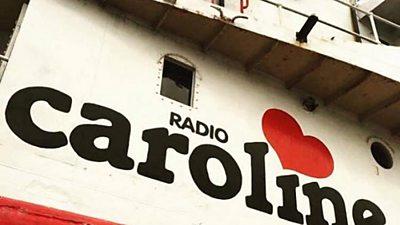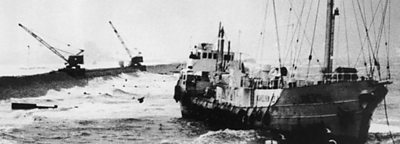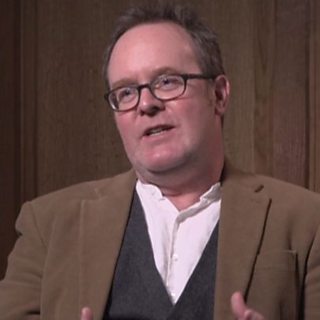These were, of course, radio pirates beaming the sounds of a new musical generation into the living rooms of houses up and down the country from ships and forts around the coast – ostensibly outside British territorial waters.
The first, Radio Caroline, had begun regular broadcasting on Saturday 28 March 1964, off the coast of Felixstowe. Others, such as Radio Atlanta (Frinton-on-Sea), Radio Scotland (Dunbar / Troon), Radio 390 (Red Sands Fort, Whitstable) and Radio London (Frinton-on-Sea), soon followed building up an audience of millions.
The pirates reflected and catered for a changing attitude, especially among young people, towards the place of popular culture in the life of the nation. From Bill Haley & His Comets’ hit record Rock Around the Clock a decade earlier, to The Beatles and The Rolling Stones, music had become emblematic of a new expressionism that redefined the spirit of the age.
For Terry Wogan, the pirate radio stations had an immediate impact, not just on listeners, but also on the BBC, government policy and the music industry more widely.
As Postmaster-General between 1964 and 1966, responsible for the administration of broadcasting in the UK, Tony Benn was vehemently opposed to the pirate radio stations. Yet, he was willing to concede “the case for having popular music available, because they [young people] wanted it and why not”.
The view from the upper echelons of the BBC was, however, initially resistant to this idea when Benn put it to the BBC’s Chairman, Lord Normanbrook, who is reported to have replied: “You can’t have popular music all the time, it would be like having the pubs open all day.”
Similarly unconvinced, when the BBC’s own forward-looking Director of Sound Broadcasting, Frank Gillard, proposed the introduction of a continuous popular music station to the BBC Board of Governors, he was informed that “if we had known, Mr Gillard, that you had such ideas in your head we should never have appointed you”.
The problem of the pirate stations remained and as time marched on both the BBC and the government looked increasingly out of touch with modern cultural tastes. Something had to be done, as the BBC’s Director-General at the time, Hugh Carleton Greene, explains:
The growing appetite for a regular diet of popular music presented both the British government, who regulated radio in the UK, and the BBC, as the national broadcaster, with a major challenge. How might they accommodate, within existing regulatory and broadcasting structures, the needs of this increasingly influential demographic of “pop” listeners?
As it stood, the pirate stations were unlicensed and did not observe copyright law. Yet, they were important commercial players in promoting the popular music industry and in offering new advertising opportunities.
The BBC had already attempted to address the rise of pop music with the introduction of programmes such as Saturday Club (1958) and Top Gear (1964), which mixed records and live sessions with, for example, Jimi Hendrix, The Who, Dusty Springfield and The Beatles. But these were limited concessions against a rising tide of popular demand.
Moreover, the BBC was ill prepared to compete with the spontaneity of the pirate radio stations as Johnny Beerling, who produced the first ever programme on Radio 1, recalled in an interview for the BBC Connected Histories project.
Emerging as a result of these negotiations, the government’s December 1966 White Paper on Broadcasting Policy paved the way for a new popular music service at the BBC, but it didn’t deal with the obvious threat to its success that would come from the already established pirate radio stations. That required an altogether different, and punitive, approach.
The statutory instrument chosen to deal with the pirates was the Marine &C., Broadcasting (Offences) Act, which came into effect from 14 August 1967. Unable to directly ban those stations operating outside British territorial waters, the new Act of Parliament made it a criminal offence for British citizens to work for or assist in the running of these stations.
With one stroke of the legislative pen, the pirate radio stations were decimated. A few, such as Radio Caroline, continued under these new restrictions, but most like the esteemed Radio London closed. By September 1967, the power of the pirate radio stations had all but gone.
The pirate stations had helped shape a revolution in listening habits in the UK, but it was the BBC that inherited the fruits of this pioneering effort. As Robin Scott, the newly installed BBC joint Controller of the Light Programme and the Popular Music Service in 1967 – later to become Radio 2 and Radio 1, respectively – explains, it was his job to reconstruct the architecture of pop music broadcasting out of the ruins of the pirate stations.
The Caroline Phenomenon

If, externally, the BBC gave the appearance of indifference at the arrival of the pirate radio stations in 1964, internally alarm bells were ringing. Almost immediately a coordinated attempt was made to assess the risk posed by the first of them, Radio Caroline.
As can now be seen for the first time in a newly released ‘confidential’ document in the BBC archives, The Caroline Phenomenon, as it was called, examined four critical questions:
- Who listens to Caroline?
- How much is Caroline listened to?
- The nature of Caroline listening
- Attitudes towards Caroline
The fieldwork was a sample survey of 1000 people in the Southeast and Northeast of England, undertaken by Mass Observation on the instructions of the BBC Audience Research Department.
-
The Caroline Phenomenon: Autumn 1964 An Audience Research Report
The report reveals a deep concern with the demographic make-up of Caroline’s audience, comparing it with the BBC’s own services, especially the Light Programme. Particularly striking was the youthful nature of Caroline’s listeners who the report describes as “addicts”. Also of interest was the finding that while listening to BBC services declined during the course of the day, Caroline’s remained remarkably steady. These were committed addicts.
The Caroline Phenomenon gives an insight into the BBC’s keen awareness of the threat posed to its services by the pirate radio stations. It also marks the beginning of a process in which the BBC came to terms with a new type of radio audience, one dedicated to pop music. Ultimately, it fires the starting gun on the BBC’s own plans to start a popular music service, based on the pirate radio model.
Related links
-
PAMS Jingles Creators of the 1967 Radio 1 launch jingles (composer: David Cunningham)


